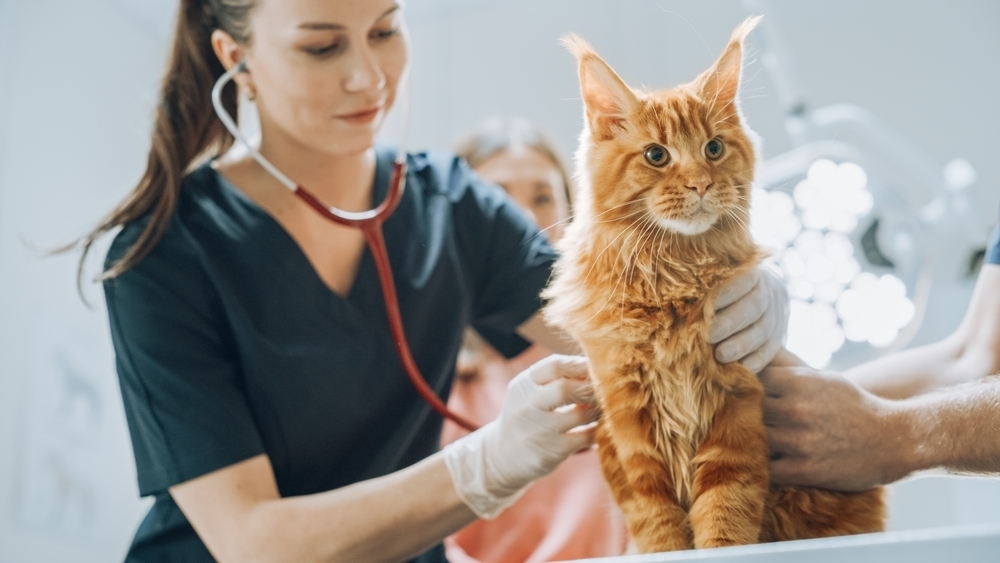
☝️ The most important facts in brief
- The average gross salary for veterinarians in Germany is €4,515 per month or €54,180 per year.
- You can expect an annual salary of €42,024 when you start your career straight after graduating.
- Regional differences, the size of the company and gender all play a role in salary levels.
- Further training and specialisations, such as becoming a specialist veterinarian, can significantly increase your salary.
📖 Table of contents
As a vet, you take on a responsible role in which you look after the health and welfare of animals. You treat various diseases in animals, treat wounds and administer medication. The profession of vet offers a wide range of opportunities, whether in veterinary clinics, with breeders or animal owners. But what about the salary as a vet? In this article, you will find out what you can earn as a vet in Germany and which factors influence your salary.
Are you interested in studying medicine?
We will be happy to advise you free of charge about your options for studying medicine, including advice on studying medicine in another EU country, which is fully recognised in Germany.

Study medicine abroad with futuredoctor
Do you dream of studying medicine, but the chances of getting a place in your home country are slim? We can help you find a suitable study place abroad.
Advantages at a glance:
- EU-wide recognised qualifications
- Study in English or German
- > 95% Success rate
- > 1,000 study places allocated
From the selection of universities and support in the application process to orientation and finding accommodation - we are at your side.
Starting salary and average salary of veterinarians
As a career starter, you can expect an average starting salary of €3,062 gross per month. However, the starting salary varies depending on the field of work: in large and farm animal medicine, it is slightly higher than the average at €3,482.
Over the course of your career as a salaried veterinarian, you can expect an average salary of €3,439 gross per month or €19.84 per hour working 40 hours per week. This corresponds to an annual salary of between €40,000 and €45,000. However, there is a wide salary range here, as there are no existing collective agreements.
Nationwide salary recommendations from interest groups serve as a guide. These are based on internet research, valid collective labour agreements and the experience of consultants in veterinary medicine. Nevertheless, there are no fixed working time regulations for salaried veterinarians, although the Working Hours Act naturally applies.
Salary differences by type of organisation and employment model
If you work as a vet, your salary will depend heavily on the type of organisation and your employment model. In veterinary practices and veterinary clinics, there are two common salary models for salaried vets: a fixed salary or a basic salary with bonuses.
Veterinarian salary: The fixed salary model
With a fixed salary, you receive a fixed monthly amount based on the number of hours you work. This model offers financial security and predictability, regardless of how busy the practice or clinic is. The average gross monthly salary for a 40-hour week is between €3,089 and €3,546.
Vet salary: The premium model
The bonus model, on the other hand, consists of a basic salary of around €3,000 gross per month, which is supplemented by performance-related bonuses. These bonuses are usually based on the turnover you generate for the practice or clinic and can amount to between 25% and 35% of your basic salary. This model offers the chance of a higher overall salary as a veterinary surgeon, but also involves a certain financial risk in the event of lower capacity utilisation.
Salary as a veterinarian in the public sector
In the public sector, for example as an official veterinarian, your salary is based on the respective state salary scales. In salary group A13, the average gross monthly salary is €5,415. In managerial positions (pay grade A14), you can even earn up to €6,633 per month.
As you can see, the salary differences for veterinarians can be considerable depending on the organisation and employment model. While the fixed salary offers planning security, the bonus model opens up the opportunity for a higher income. In the public sector, on the other hand, salaries are clearly regulated and offer attractive earning opportunities, especially in management positions.
Factors influencing the vet's salary
The salary of veterinarians is influenced by various factors. Your professional experience plays an important role in your income. The longer you have been practising, the more you will generally earn. Veterinarians with less than 3 years of experience earn an average of €61,720, while those with over 9 years of experience earn an average of €92,587 per year.
Professional experience | Average salary per year |
<3 years | 61.720 € |
3-6 years | 66.731 € |
7-9 years | 73.437 € |
>9 years | 92.587 € |
As is often the case in the medical sector, your age and gender can also lead to salary differences. In comparison, female vets often earn less than their male colleagues - but this is certainly a matter for negotiation with the employer.

Vet salary: These regional differences exist
The salary of veterinarians in Germany also varies depending on the region and city. In federal states with a strong economy and a higher cost of living, such as Bavaria or Baden-Württemberg, veterinarians can often expect a higher salary than in other parts of Germany. In large cities such as Munich or Leipzig, the average veterinary salary is also usually higher than the national average, as the demand for veterinary services (treatments and operations) is particularly high here.
In order to take regional differences in veterinary salaries into account, professional organisations such as the German Association of Practising Veterinarians (bpt) recommend supplements for regions with a higher cost of living. These supplements can vary depending on the federal state and city and usually amount to between 5% and 15% on the basic salary.
The following table shows the average gross monthly salaries for veterinarians in selected federal states and cities:
| State / City | Average gross monthly salary |
| Bavaria | 4,200 EUR - 5,500 EUR |
| Baden-Württemberg | 4,000 EUR - 5,300 EUR |
| North Rhine-Westphalia | 3,800 EUR - 5,000 EUR |
| Hesse | 3,900 EUR - 5,100 EUR |
| Lower Saxony | 3,600 EUR - 4,800 EUR |
| Berlin | 3,700 EUR - 4,900 EUR |
| Hamburg | 4,000 EUR - 5,200 EUR |
| Munich | 4,500 EUR - 6,000 EUR |
| Frankfurt am Main | 4,200 EUR - 5,500 EUR |
| Stuttgart | 4,100 EUR - 5,400 EUR |
| Leipzig | 3,500 EUR - 4,700 EUR |
It is of course important to note that these are average values and that the actual salary may vary depending on the practice, specialisation and individual professional experience. Nevertheless, these regional salary differences provide guidance for veterinarians when choosing where to work and help them to negotiate a fair salary in line with local conditions.
Earning potential with your own practice as an independent vet
As a self-employed vet with your own practice, you can significantly increase your income. According to statistics, the majority of freelance vets in Germany earn an annual income of between 100,000 and 300,000 euros. Small animal practices are particularly lucrative, representing the most common type of practice at 57 per cent.
However, running your own veterinary practice requires not only professional expertise but also entrepreneurial know-how and commitment. Self-employed veterinarians often work significantly more than 50 hours a week and invest a lot of time and money in their practice. For example, an average of around 160,000 euros is required to set up a new small animal practice, while taking over an existing practice costs an average of 123,000 euros.
It is also interesting to note that more and more women are venturing into self-employment: the proportion of female practice founders rose to 73 per cent, exceeding the general proportion of women in the veterinary profession (51 per cent). The average age of setting up a practice is 37.5 years, with 75 per cent becoming self-employed by the age of 40.
Overall, having your own veterinary practice offers good earning potential, but also requires a lot of commitment and investment. However, if you are prepared to take on the challenges of self-employment, you can earn a significantly higher income as a self-employed vet than as an employee.
Salary increase through further training and specialisation
As a veterinarian, you have various opportunities to increase your salary through targeted further training and specialisation. One attractive option is further training to become a specialised veterinarian in areas such as Surgerypathology, internal medicine or for certain animal species such as horses, cattle, pigs or poultry. With such an additional qualification, you can not only advance your career, but also significantly increase your earning potential.
According to statistics, specialised veterinarians, such as equine veterinarians, can reach an annual salary of over €80,000. This is well above the average salary of vets with around 5 years of professional experience, which is between €60,000 and €75,000. Suitable further and advanced training in the veterinary field can also improve your promotion prospects and earning potential.
It is therefore worth investing continuously in your professional development and honing your skills profile. This will open up new career prospects for you and allow you to benefit from a higher salary in the long term. Find out about interesting further training opportunities and specialisation options that match your professional goals and use them specifically to increase your salary.
Free information material
Studying medicine abroad 🎉
Order your info pack now, find out more about the Studying medicine abroad and get started as a medical student!





